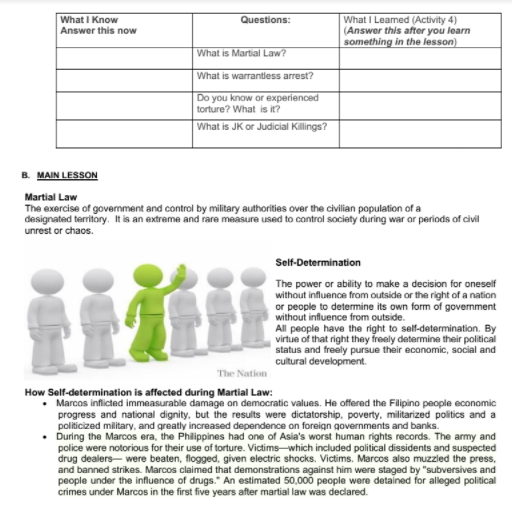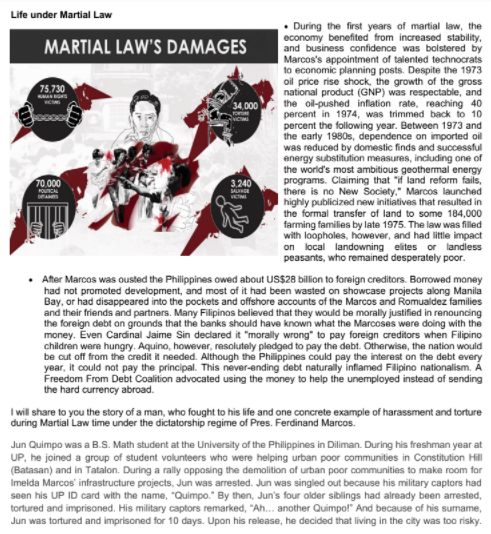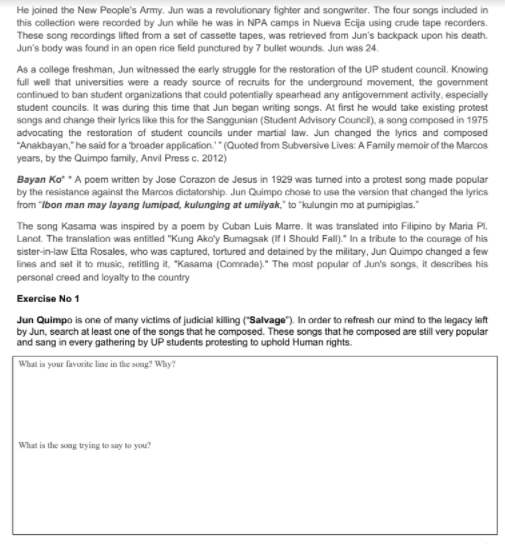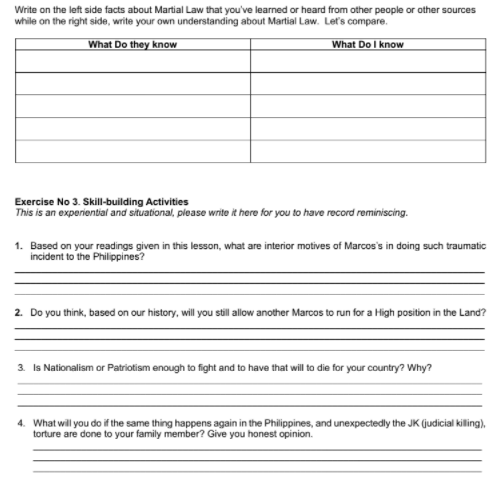please see attached reference and answer the following activities
https://drive.google.com/file/d/1zvio84y25UQI912aZLPye7NeXcZBt6tO/view?usp=sharing
What I Know Questions: What I Learned (Activity 4) Answer this now Answer this after you learn something in the lesson] What is Martial Law? What is warrantless arrest? Do you know or experienced torture? What is it? What is JK or Judicial Killings? B. MAIN LESSON Martial Law The exercise of government and control by military authorities over the civilian population of a designated territory. It is an extreme and rare measure used to control society during war or periods of civil unrest or chaos. Self-Determination The power or ability to make a decision for oneself without influence from outside or the right of a nation or people to determine its own form of government without influence from outside. All people have the right to sell-determination. By virtue of that right they freely determine their political status and freely pursue their economic, social and cultural development. The Nation How Self-determination is affected during Martial Law: Marcos inflicted immeasurable damage on democratic values. He offered the Filipino people economic progress and national dignity, but the results were dictatorship, poverty, militarized politics and a politicized military, and greatly increased dependence on foreign governments and banks. During the Marcos era, the Philippines had one of Asia's worst human rights records. The army and police were notorious for their use of torture. Victims-which included political dissidents and suspected drug dealers- were beaten, flogged, given electric shocks. Victims. Marcos also muzzled the press, and banned strikes. Marcos claimed that demonstrations against him were staged by "subversives and people under the influence of drugs." An estimated 50,000 people were detained for alleged political crimes under Marcos in the first five years after martial law was declared.Life under Martial Law . During the first years of martial law, the MARTIAL LAW'S DAMAGES economy benefited from increased stability, and business confidence was bolstered by Marcos's appointment of talented technocrats in economic planning posts. Despite the 1973 75.730 oil price rise shock, the growth of the gross national product (GNP) was respectable, and the oil-pushed inflation rate, reaching 40 percent in 1974, was trimmed back to 10 percent the following year. Between 1973 and the early 1980s, dependence on imported oil was reduced by domestic finds and successful energy substitution measures, including one of the world's most ambitious geothermal energy 70 000 3.240 programs. Claiming that "if land reform fails, there is no New Society," Marcos launched highly publicized new initiatives that resulted in the formal transfer of land to some 184,000 farming families by late 1975. The law was filled with loopholes, however, and had little impact on local landowning elites or landless peasants, who remained desperately poor. After Marcos was ousted the Philippines owed about US$28 billion to foreign creditors. Borrowed money had not promoted development, and most of it had been wasted on showcase projects along Manila Bay, or had disappeared into the pockets and offshore accounts of the Marcos and Romualdez families and their friends and partners. Many Filipinos believed that they would be morally justified in renouncing the foreign debt on grounds that the banks should have known what the Marcoses were doing with the money. Even Cardinal Jaime Sin declared it "morally wrong" to pay foreign creditors when Filipino children were hungry. Aquino, however, resolutely pledged to pay the debt. Otherwise, the nation would be cut off from the credit it needed. Although the Philippines could pay the interest on the debt every year, it could not pay the principal. This never-ending debt naturally inflamed Filipino nationalism. A Freedom From Debt Coalition advocated using the money to help the unemployed instead of sending the hard currency abroad. I will share to you the story of a man, who fought to his life and one concrete example of harassment and torture during Martial Law time under the dictatorship regime of Pres. Ferdinand Marcos. Jun Quimpo was a B.S. Math student at the University of the Philippines in Diliman. During his freshman year at UP, he joined a group of student volunteers who were helping urban poor communities in Constitution Hill (Batasan) and in Tatalon. During a rally opposing the demolition of urban poor communities to make room for Imelda Marcos' infrastructure projects, Jun was arrested. Jun was singled out because his military captors had seen his UP ID card with the name, "Quimpo." By then, Jun's four older siblings had already been arrested, tortured and imprisoned. His military captors remarked, "Ah... another Quimpol" And because of his sumame, Jun was tortured and imprisoned for 10 days. Upon his release, he decided that living in the city was too risky.He joined the New People's Army. Jun was a revolutionary fighter and songwriter. The four songs included in this collection were recorded by Jun while he was in NPA camps in Nueva Ecija using crude tape recorders. These song recordings lifted from a set of cassette tapes, was retrieved from Jun's backpack upon his death. Jun's body was found in an open rice field punctured by 7 bullet wounds. Jun was 24. As a college freshman, Jun witnessed the early struggle for the restoration of the UP student council. Knowing full well that universities were a ready source of recruits for the underground movement, the government continued to ban student organizations that could potentially spearhead any antigovernment activity, especially student councils. It was during this time that Jun began writing songs. At first he would take existing protest songs and change their lyrics like this for the Sanggunian (Student Advisory Council), a song composed in 1975 advocating the restoration of student councils under martial law. Jun changed the lyrics and composed "Anakbayan, " he said for a 'broader application.' *(Quoted from Subversive Lives: A Family memoir of the Marcos years, by the Quimpo family, Anvil Press c. 2012) Bayan Ko" * A poem written by Jose Corazon de Jesus in 1929 was turned into a protest song made popular by the resistance against the Marcos dictatorship. Jun Quimpo chose to use the version that changed the lyrics from "Ibon man may layang lumipad, kulunging at umiiyak, " to "kulungin mo at pumipiglas." The song Kasama was inspired by a poem by Cuban Luis Marre. It was translated into Filipino by Maria Pl. Lanot. The translation was entitled "Kung Ako'y Bumagsak (If I Should Fall)." In a tribute to the courage of his sister-in-law Etta Rosales, who was captured, tortured and detained by the military, Jun Quimpo changed a few lines and set it to music, refilling it, "Kasama (Comrade)." The most popular of Jun's songs, it describes his personal creed and loyalty to the country Exercise No 1 Jun Quimpo is one of many victims of judicial killing ("Salvage"). In order to refresh our mind to the legacy left by Jun, search at least one of the songs that he composed. These songs that he composed are still very popular and sang in every gathering by UP students protesting to uphold Human rights. What is your favorite line in the sung? Why? What is the song trying to say to you?Write on the left side facts about Martial Law that you've learned or heard from other people or other sources while on the right side, write your own understanding about Martial Law. Let's compare. What Do they know What Do I know Exercise No 3. Skill-building Activities This is an exponential and situational, please write it here for you to have record reminiscing. 1. Based on your readings given in this lesson, what are interior motives of Marcos's in doing such traumatic incident to the Philippines? 2. Do you think, based on our history, will you still allow another Marcos to run for a High position in the Land? 3. Is Nationalism or Patriotism enough to fight and to have that will to die for your country? Why? 4. What will you do if the same thing happens again in the Philippines, and unexpectedly the JK (judicial killing), torture are done to your family member? Give you honest opinion










